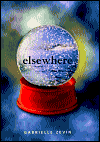 I was prepared to dislike Elsewhere by Gabrielle Zevin.
I was prepared to dislike Elsewhere by Gabrielle Zevin.Oh no, I groaned, not another teen-dies-and-the-story-is-told-from-dead-teen's view. I sneered prematurely at all that I think about that particular sub-genre: that it plays into teen drama (You'll be sorry when I'm dead!), complete with viewing crying and distraught family, along with a bit of a lesson: life is short, so live life.
But people I respect liked it, so I read it. And turns out, I LOVED it.
The Plot: Liz, 15, is killed in a hit and run and discovers that life after death is "Elsewhere." In Elsewhere, people age backwards; when they become babies, they return to Earth and are reborn. While in Elsewhere, people work at an avocation -- basically, their dream job -- which may or may not be their Earth job. Their are holidays, cars, homes -- it's very similar to Earth. Liz is very pissed that by aging backwards she'll never get her driver's license, go to Prom, or fall in love.
The Good: Of course, Liz learns that life (even if one is dead) is short, so live it. But Liz also learns about choice. At one point, as she's sulking in the afterlife, another character tells her she has a choice. It wasn't my choice to die, Liz replies. But that's not the choices that are important here: instead, it's the day to day choices, including the choice to be happy, even when you're dead and all your dreams are gone -- because you need to be alive for those dreams. It's not so much about making lemonade out of lemons, as realizing sometimes, to be happy, you have to change your dream.
Also good is the perspective on aging that is not that different from real life. As people age backward, hair grows back, tattoos disappear. Memories stay intact; so someone who looks 18 may really be 40, based on when they died and how long they have been "Elsewhere." But then the people get really young: teeth fall out. By the age of 4 or 5, the memories are disappearing and they need someone to take care of them. Luckily for them, family is there to take care of them -- these cute little babies who have regressed.
As I read this, it struck me that the aging in Elsewhere is no different than here. Those who have the bad luck to not age "gracefully" (in other words, those who lose their teeth, control over body parts and functions, and memory; those with aches and pains) become dependent on others. They need caregivers; but, unlike Elsewhere, they are not cute 2 year old tots. I think that part of Elsewhere's message is that we should treat the old better than we do.
No comments:
Post a Comment